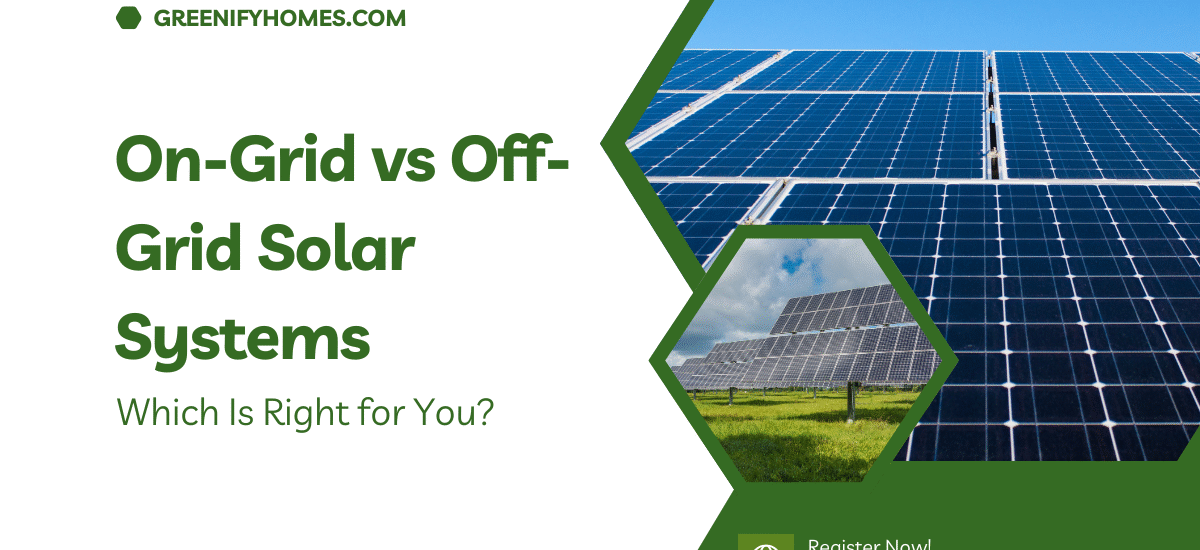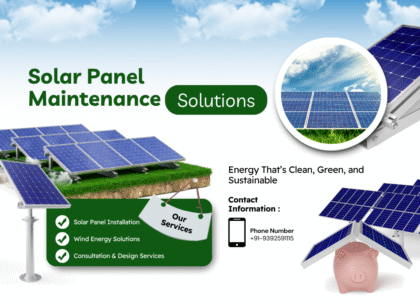Introduction
So you’ve decided to go solar — great move! But now you’re faced with a big question: Should you go for an on-grid or off-grid system? It’s one of the most important decisions you’ll make when investing in solar energy for your home.
This guide will break down the pros, cons, costs, and use-cases of each system so you can make the best choice for your home and lifestyle.
What is an On-Grid Solar System?
How It Works
An on-grid system is connected to the main electricity grid. During the day, your solar panels generate electricity. If you produce more than you consume, the excess is sent to the grid. If you need more power (like at night), you pull it from the grid.
Key Components
- Solar panels
- Grid-tied inverter
- AC/DC disconnect switches
- Net meter
Pros
- Lower initial cost (no battery)
- Eligible for net metering
- Maintenance is minimal
- Best ROI for urban homes
Cons
- Doesn’t work during a power outage
- Total dependence on grid connection
What is an Off-Grid Solar System?
How It Works
An off-grid system is completely independent of the grid. It generates and stores energy in batteries. You use the stored power when the sun isn’t shining.
Key Components
- Solar panels
- Charge controller
- Inverter
- Battery bank
Pros
- Works even during blackouts
- Great for remote areas
- Full energy independence
Cons
- Expensive due to batteries
- Batteries need maintenance/replacement
- Risk of running out of power on cloudy days
Key Differences Between On-Grid and Off-Grid Systems
| Feature | On-Grid System | Off-Grid System |
|---|---|---|
| Grid Connection | Required | Not required |
| Battery | Not needed | Required |
| Cost | Lower | Higher |
| Backup Power | No (unless hybrid) | Yes |
| Ideal For | Urban homes | Remote or rural areas |
| Net Metering | Yes | No |
| Maintenance | Low | Medium to High |
Which System is More Cost-Effective?
On-grid systems are more affordable upfront — no battery cost, easy maintenance, and quick payback through net metering.
Off-grid systems offer freedom but are 30–50% more expensive due to battery storage and additional components.
If cost is your primary concern and your area has reliable electricity, on-grid is the winner.
Which One is Best for You?
- Live in a city?
Go on-grid and take advantage of net metering to reduce your bill. - Live in a village or area with frequent blackouts?
Off-grid makes more sense despite the higher cost. - Own a farmhouse or weekend home?
Off-grid is best because power outages won’t affect you. - Want the best of both worlds?
Consider a hybrid system (see below).
Government Subsidies and Net Metering (2025)
✅ On-grid systems are eligible for up to 40% subsidy under MNRE
✅ Off-grid systems may get partial support in rural electrification schemes
✅ Net metering available in most Indian states — lets you sell excess power and slash your bills
Check with your local DISCOM or use a platform like Greenify Homes to get an accurate subsidy estimate for your location.
Hybrid Solar Systems – A Middle Path
Can’t decide? You don’t have to.
Hybrid systems combine the benefits of both:
- Stay connected to the grid
- Have backup battery storage for outages
- Enjoy net metering AND blackout protection
🔋 Downsides? They’re the most expensive — but also the most reliable.
Final Thoughts
Choosing between on-grid and off-grid depends on your needs, location, and budget. If you live in an urban area with a stable power supply, an on-grid system is cost-effective and hassle-free. If you’re in a remote location or want total energy independence, go off-grid.
And if you’re willing to spend a bit more for peace of mind, hybrid might just be your perfect match.
FAQs
1. Can I use AC during power cuts with on-grid systems?
A. No. On-grid systems shut down during outages unless you use a hybrid inverter with batteries.
2. What is the lifespan of batteries in off-grid systems?
A. Typically 5–7 years, depending on usage and type.
3. Can I upgrade my on-grid system to hybrid later?
A. Yes, if your inverter supports it or you add a hybrid inverter and battery later.
4. Is net metering available everywhere in India?
A. Most states support it, but policies vary — check with your local electricity board.
5. What’s the average payback time for on-grid vs off-grid?
A. On-grid: 4–6 years. Off-grid: 7–10 years due to higher initial investment.









